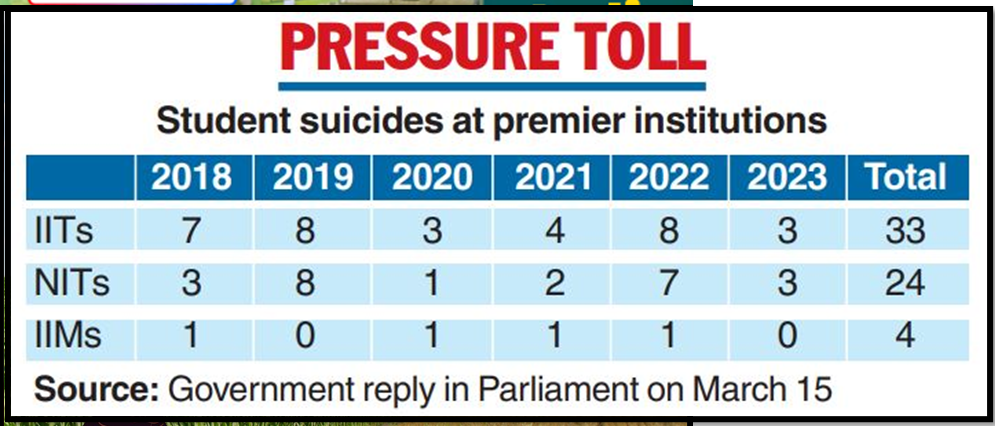ADDRESSING CAMPUS UNHAPPINESS IN PREMIER INSTITUTES: RECOGNIZING REALITIES AND SEEKING SOLUTIONS”
Syllabus:
- GS-1- Issue of Unemployment ,Youth suicides and welfare
- GS-4-Ethical dilemma related case study , ethics in human interface , values of tolerance, attitude , integrity , Value education
Focus :
- Recent student suicides in premier institutes like IITs highlight a systemic issue demanding attention.
- Steps taken in IIT Delhi to address academic distress among students.
Source- GOI
Introduction:
- According to the most recent data from NCRB, over 13,000 students in India died by 2021 at a pace of over 35 per day.
- Various measures undertaken by institutes to assist troubled students.These steps address symptoms but not root causes.
An Analogy: Heart Disease vs. Unhappiness:
- Comparison drawn between addressing heart disease and student unhappiness. There is a need to address broader issues causing unhappiness, akin to lifestyle factors contributing to heart disease.
The Misconception of IITs:
- Public perception of IITs focused on job prospects rather than education quality.
- Disparity between media portrayal of high salaries and the reality of education standards.
The Price of Competition:
- Intense competition for admission to IITs takes a toll on students.
- Early exposure to coaching centres isolates students from social and moral aspects.
Hypothetical Experiment and Realities:
- Thought experiment: Rewarding candidates with a social conscience.
- Parental pressure driven by the perception of IITs offering early career guarantees.
Undergraduate Discontent:
- Unrealistic expectations and disappointment among undergraduate students.
- Challenges faced in coping with rigorous academic standards and career prospects.
Postgraduate and PhD Challenges:
- Postgraduate students from smaller colleges face additional challenges.
- PhD students encounter difficulties due to inadequate research preparation.
| Initiatives taken by India :
1.Mental Healthcare Act (MHA), 2017: Objective: MHA 2017 aims to provide mental healthcare services for persons with mental illness. 2.KIRAN:
3.Manodarpan Initiative:
4.National Suicide Prevention Strategy:
|
Proposed Solutions:
- Educating stakeholders about realistic career prospects for IIT graduates.
- Engaging with media to portray accurate career paths.
- Transforming placement offices into career guidance centers.
- Implementing smaller classrooms for personalized teaching.
- Providing mentorship from senior PhD students.
- Rethinking student festivals to prioritize academic discussions.
Conclusion:
- Institutes should prioritize learning over placement.
- Realistic expectations and viable alternatives can mitigate campus unhappiness.
Source:Indian Express
Mains Practice Question :
GS1-
“Discuss the factors contributing to unhappiness among students in premier institutes like IITs in India. What measures can be taken by educational institutions, policymakers, and stakeholders to address this issue effectively?” (250 words)
GS4-
Amidst the backdrop of intense academic competition and sky-high career expectations prevalent in premier educational institutions like the Indian Institutes of Technology (IITs), a series of tragic incidents of student suicides has sparked nationwide concern. The pressure to excel academically, coupled with the fear of failure and the relentless pursuit of success, has taken a toll on the mental health and well-being of students.
Questions:
- Identify the ethical dilemmas faced by students grappling with academic pressure and high career expectations in institutions like the IITs.
- Discuss the role of educational institutions, faculty members, and policymakers in creating an environment conducive to student well-being and mental health.
- Evaluate the ethical responsibilities of parents and society in addressing the mental health challenges faced by students pursuing higher education.




